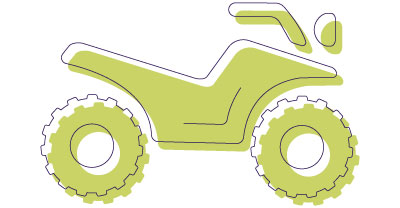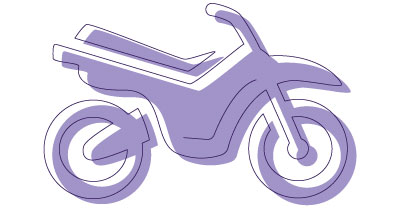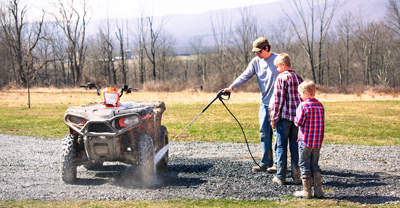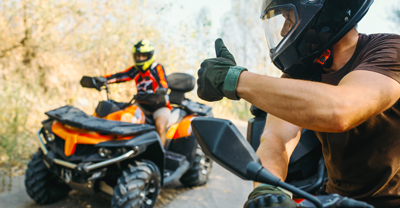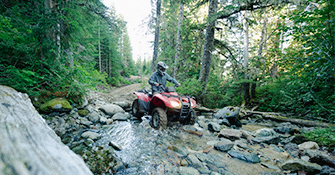Top off-road vehicle insurance coverages for fall
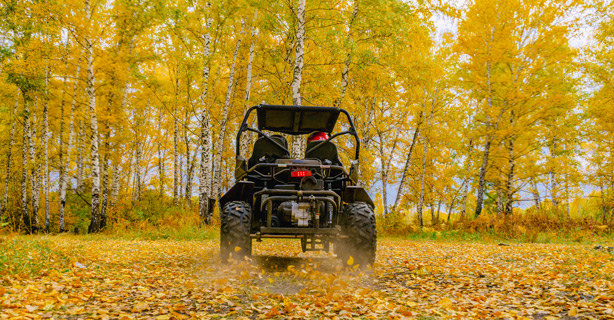
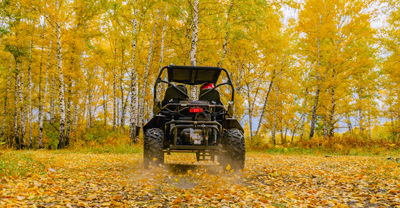
0 min. read
Across the country, fall is ideal for off-roading. Cooler temperatures make for comfortable riding and the scenery is hard to beat. But fall does present some unique challenges, which is why insuring your off-road vehicle (ORV) is worth it—even if it’s not required in your state.
Hazards of off-roading in the fall
Shorter daylight hours
Long summer days don’t last forever. And while the temperatures and conditions are still great for your favorite motorsports, you’ll have to plan for earlier sunsets.
In low light or darkness, you rely on your headlights for visibility. Obstacles appear when they enter your headlight beam, so you’ll have less time to react. The same goes for other riders seeing and reacting to you on the trail.
Animals tend to move more in the dark. You could encounter deer, bear, etc. on the trails earlier in the evening than would be typical in the summer months.
Adverse weather
The onset of fall can also mean slicker trails. Dropping temperatures and more precipitation can make it more difficult to maintain control of your vehicle and react quickly to obstacles.
Fallen leaves paired with rain or morning frost can change the grip your tires have on the terrain. Snow can make trails impassable for some ORVs and treacherous for others. Also, be aware that your vehicle will handle differently on wet snow, powdery snow, packed snow, fresh snow, and ice.
Busy trails
Fall colors bring a lot of people out to the trails to experience the beautiful scenery. It’s part of the fall off-road experience! But leaf-watchers have different motivations than off-road enthusiasts, and will likely make frequent stops for photo ops.
Color-chasing tourists may also be less experienced with ORVs, so it’s essential to practice defensive riding. Watch for stopped traffic, slow vehicles, pedestrians, and riders who may not react like you expect them to.

Coverages for your off-road vehicle
Bodily injury liability
Let’s say you’re riding your dirt bike with a group of friends, and you misjudge a curve, causing an accident where another rider is injured. Bodily injury liability coverage can help pay for their medical bills, lost wages, and other associated costs. Without it, you could be responsible for tens of thousands of dollars in out-of-pocket costs.
Property damage liability
When you’re in an off-road accident, you might cause high-dollar damage to another person’s property. If, for example, you take out someone’s fence while riding your snowmobile through an unexpected whiteout snowstorm, property damage liability coverage can help pay to fix or replace it. Just keep in mind, this coverage won’t pay for damage you cause to your own property.
Collision
Off-road collision coverage can help pay for damage to your own ORV following a covered accident involving another vehicle or a collision with a stationary object—for example, if you skid on an icy patch into a tree or misjudge a rocky incline in low light and bottom out.
Comprehensive
If your snowmobile is lost in a housefire, it likely won’t be covered by your homeowner’s insurance. Comprehensive coverage can help pay for repairs or replacement if your ORV is damaged by something other than a collision, such as fire, theft, vandalism, or bad weather.
Trailer transport coverage
If you travel with your ORV a lot, investing in a high-quality trailer can make your life easier. But what happens if another driver loses control of their vehicle on a snowy road and your trailer is damaged on your way to the trailhead? Trailer transport coverage can help you pay to have your trailer repaired so you can get back on the road.
Optional/special equipment
Standard collision coverage may not always cover after-market parts, upgrades, or customizations. If you’ve added light kits, snow tracks, heated hand grips, or other accessories to your ORV and you’re in an accident, you may end up paying for non-stock repairs out-of-pocket. Optional/special equipment coverage can help with damage and replacement costs.
Get Dairyland® off-road vehicle insurance
An off-road vehicle insurance policy can help cover you and your prized ORV this fall. We also offer several discounts for ATV/UTV, dirt bike, and snowmobile coverage. Plus, if you have a motorcycle insurance policy with us, you can bundle and save even more.
The general information in this blog is for informational or entertainment purposes only. View our blog disclaimer.
*Data accuracy is subject to this article's publication date.








